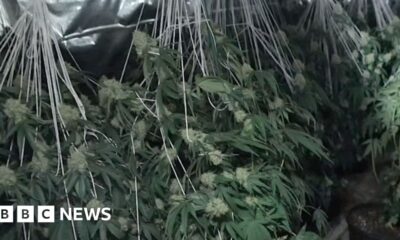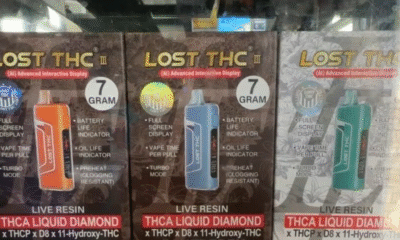featured
North Dakota Medical Marijuana Edibles Law Set To Take Effect
Published
3 days agoon

“Having something simple, straightforward, accurate and safe that we can provide to patients as a non-inhalation method of administration is going to, in my opinion, completely revolutionize the program here in North Dakota.”
By Michael Achterling, North Dakota Monitor
Changes to North Dakota’s medical marijuana program aimed at expanding program access and product options for patients are set to go into effect August 1.
The North Dakota Legislature passed a series of bills during the 2025 legislative session that changed the state’s medical marijuana laws. The new changes will allow for low-dose THC (tetrahydrocannabinol) edibles to be sold at medical dispensaries. The application process will change to allow patients easier access to the program for a longer time before needing to renew their medical cannabis cards.
House Bill 1203 will allow THC edible products to be included in the state’s medical marijuana program. The products must be hard or soft lozenges in a square shape that contain no more than 5 milligrams of THC per serving and no more than 50 milligrams in a package. Other food and beverages that contain THC will still not be allowed under the new law.
Jake Mittelsteadt, director of retail operations for Pure Dakota Health, a medical marijuana dispensary in Bismarck, said the new law allowing edible products to be sold to patients could be a gamechanger.
“Since day one of this program, the amount of people that joined the program, that come to the state, everybody, especially in the older demographics, their priorities have always been gummies and edibles,” Mittelsteadt said.
Medical dispensaries have been able to carry other oral products, such as tinctures or capsules, but edibles are what patients prefer, he said.
“Having something simple, straightforward, accurate and safe that we can provide to patients as a non-inhalation method of administration is going to, in my opinion, completely revolutionize the program here in North Dakota,” Mittelsteadt said.
Like all of the state’s medical marijuana products, the edibles will be manufactured and processed in North Dakota. Production can’t begin until August 1, so he said the new edibles should be on dispensary shelves by the end of August or early September.
There was some opposition to the changes.
Stephanie Engebretson submitted testimony in opposition to the edibles bill on behalf of the Chiefs of Police Association of North Dakota. In her testimony, she said edibles are the THC product that children are most likely to consume and the edibles take longer to feel the product’s effect, which could cause some customers to take more doses and compound the effects.
She said the organization suggested the bill be amended to require edible products to be stored in a locked location when children are present and remove the flavoring of the edible product to ensure children do not find a flavor they enjoy, if they do encounter it.
None of the suggestions were included in the final version of the legislation.
Rep. Steve Vetter, R-Grand Forks, chief sponsor of the bill allowing edibles, said he was voted into the Legislature in 2016, the same election as the medical marijuana program ballot measure, which was approved with 64 percent of the statewide vote. During that campaign, he said he heard from multiple North Dakotans about their desire for edible products.
“This is a bigger deal, generally, for the elderly population,” Vetter said. He added the effects of edible products react differently in the body compared to other methods of delivery and can be beneficial for some ailments, like chronic pain.
Another change as a result of the bill will allow tele-health care providers to be used during an initial meeting to qualify a patient’s illness for a medical marijuana card. More than two dozen debilitating illnesses qualify for the medical cannabis program under state law.
Mittelsteadt said he believes removing the in-person visit hurdles will allow more potential patients into the medical marijuana program. Previously, tele-health appointments could only be used to renew a patient’s medical marijuana card.
He said the tele-health option is also important because some North Dakota health care providers have refused to issue chronic condition documentation for patients to obtain their cards. Mittelsteadt added there is no health care provider in Williston willing to meet with patients to obtain a medical marijuana card. The closest health care provider willing to work with potential medical marijuana patients in northwest North Dakota is in Watford City, he said.
“That certainly has gotten better over the years as people have become more comfortable with it [the program],” Mittelsteadt said. “But it has also been a gigantic pain point for us and for patients here in North Dakota.”
Jason Wahl, director of the medical marijuana program for the Department of Health and Human Services, said the state cannot force health care providers to participate in the medical marijuana application process.
“It is completely up to that health care provider. The department has no say in regards to that, nor should the department have a say in regards to what a health care provider is going to do with their patient,” Wahl said.
Another new law, Senate Bill 2294, will change the expiration dates of medical marijuana cards from one-year to two-year terms.
Vetter said the competition from recreational cannabis markets in neighboring Montana and Minnesota will be something lawmakers will need to continue to monitor to keep North Dakota’s medical marijuana program stable.
“That was a driving force this last time, essentially, if we don’t keep these places open, then what we have is a bunch of people breaking the law,” he said.
Mittelsteadt said Pure Dakota Health has retail locations in Williston, Bismarck and Fargo, but the Williston location has not seen as much of an increase in foot traffic over the last year.
“Our Williston location is so close to the [Montana] border that we have some competition there,” he said. “But looking here in Bismarck, we’ve definitely seen a marketable growth in patient count over the last year. ”
According to the 2024 North Dakota medical marijuana annual report, more than 10,000 medical marijuana patient cards were issued by the state last year, including dozens of caregivers who are able to purchase medical marijuana for their patients who may not be able to go to a dispensary.
“While there was growth in the registered, qualifying patient population, that growth really leveled off a little while ago,” Wahl said.
Wahl said, after an initial allotment of general and special funds from the Legislature during the 2017-19 biennium to get their office up and running, the medical marijuana program’s budget has been completely covered by the permit and application fees.
North Dakota’s medical marijuana law became effective in 2017 and, by 2020, the medical cannabis dispensaries raked up $6.4 million in total sales. Sales tripled over the next two years, rising to $20 million in 2022, but have recently stabilized, totaling $22.4 million last year.
Under state law, North Dakota allows only two permitted manufacturing and processing facilities and eight retail dispensaries for the entire state.
Another bill set to take effect in August, Senate Bill 2293, will set the maximum container size for THC concentrate at 1 gram. It also allows those who are unable to receive North Dakota identification cards due to a medical condition to submit other documentation to qualify for the medical marijuana program.
Mittelsteadt said the 2025 legislative session was a big step forward in preserving the medical marijuana program in North Dakota.
“This most recent legislative session has been the most promising, in terms of them saying, ‘Let’s do something to actually benefit the patients and actually benefit the program,’” Mittelsteadt said. “Let’s keep running with it. Listen to the feedback from the patients, listen to the feedback from the industry…just using common sense when we’re looking at this is going to be vital.”
This story was first published by North Dakota Monitor.
Photo courtesy of Pexels/Kindel Media.

Author: mscannabiz.com
MScannaBIZ for all you Mississippi Cannabis News and Information.
You may like
-


Drug bust finds pounds of cocaine, cannabis at NY residence: Chautauqua Co. Sheriff’s Office
-


How Alcohol And Cannabis Affect Gut Health
-


Inside a huge High Street cannabis farm in Huntingdon
-


LEEF Brands Announces CAD $1 Million Private Placement
-


One Dose. Two Years. Psilocybin Can Ease Depression In Cancer Patients, New Research Shows
-


Mississippi AG takes aim at hemp products, including Delta THC | News

It has become a wellness focus, but how does marijuana and alcohol impact gut health?
Its awareness has significantly increased in the last decad, becoming a popular topic in both scientific research and public consciousness. While the concept of the gut-brain axis and the importance of the gut microbiome has been studied for decades, it is only recently that the general public has become more aware of the impact of gut health on overall well-being. Here is how alcohol and cannabis affect gut health.
RELATED: What To Keep In Mind When Using Cannabis To Sleep
More people are questioning how lifestyle choices—especially substance use—impact the digestive system. While alcohol and cannabis are commonly used for social and recreational purposes, they interact with the gut in strikingly different ways. Understanding these differences can help guide healthier decisions, particularly for those prioritizing wellness and long-term health.

Alcohol consumption, particularly in excess, has long been associated with poor gut health. Alcohol can damage the lining of the gastrointestinal tract, increase intestinal permeability (commonly known as “leaky gut”), and disturb the balance of the microbiome—the trillions of bacteria help regulate digestion, immune function, and even mood.
Heavy drinking promotes the overgrowth of harmful bacteria and reduces beneficial strains like Lactobacillus and Bifidobacterium. This imbalance can trigger inflammation, digestive discomfort, and weaken the gut’s natural defenses. Chronic alcohol use has also been linked to gastrointestinal diseases such as gastritis, ulcers, and inflammatory bowel disease (IBD).
Cannabis interacts with the gut through the endocannabinoid system (ECS), a network of receptors help regulate digestion, appetite, and immune response. Unlike alcohol, cannabis does not damage the gut lining or directly alter gut permeability in most users. In fact, some studies suggest cannabinoids like CBD and THC may have anti-inflammatory effects which could benefit conditions such as Crohn’s disease or irritable bowel syndrome (IBS).
Cannabis may also indirectly support gut health by reducing stress and anxiety—two factors known to worsen digestive symptoms. However, research is still emerging. Some users report slowed digestion or appetite changes with cannabis use, and smoking cannabis can carry respiratory and cardiovascular risks that don’t directly relate to the gut but may affect overall health.
RELATED: Should Cannabis Be Part Of A Practical Wellness Routine
Both alcohol and cannabis can have different effects depending on dose, frequency, and form of consumption. Occasional moderate drinking may have limited gut impact for some individuals, while daily heavy use is clearly harmful. Similarly, cannabis edibles may influence digestion differently than smoking or vaping, and high-THC products can have stronger psychoactive effects.
When it comes to gut health, alcohol tends to be a clear disruptor, while cannabis presents a more nuanced profile. While early research shows potential benefits of cannabinoids for gut inflammation and stress-related digestive issues, more clinical studies are needed.
For individuals concerned with maintaining a healthy microbiome and digestive system, moderation and informed choices remain key.

Author: mscannabiz.com
MScannaBIZ for all you Mississippi Cannabis News and Information.
featured
LEEF Brands Announces CAD $1 Million Private Placement
Published
2 hours agoon
July 24, 2025
[PRESS RELEASE] – VANCOUVER, British Columbia, July 24, 2025 – LEEF Brands Inc., a premier California and New York cannabis operator, announced a private placement offering of up to 4 million units of the company for C$0.25 per unit (the “offering price”) for gross proceeds of up to C$1 million.
Each unit will consist of one common share and one common share purchase warrant. Each warrant will entitle the holder to purchase one additional common share of the company for C$0.30 for 24 months from the closing date of the offering.
The offering is being conducted pursuant to the listed issuer financing exemption under Part 5A of National Instrument 45-106 – Prospectus Exemptions (the “LIFE Exemption”). Securities issued under the LIFE Exemption will not be subject to a statutory hold period in accordance with applicable Canadian securities laws. There is an offering document related to the Offering that can be accessed under the company’s profile at www.sedarplus.ca and at www.LeefBrands.com. Prospective investors should read this offering document before making an investment decision.
The net proceeds from the offering are anticipated to be used for general working capital purposes.
“This financing supports our momentum coming out of the first successful harvest at Salisbury Canyon Ranch and positions us to accelerate our operations in New York,” LEEF Brands CEO Micah Anderson said. “We’re focused on improving margins through vertical integration and unlocking new revenue streams as we scale production on both coasts.”
The offering is expected to close on or about Aug.10, 2025, or on such other date or dates as the company may determine. Closing of the offering is subject to customary closing conditions, including approval of the Canadian Securities Exchange (CSE).

Author: mscannabiz.com
MScannaBIZ for all you Mississippi Cannabis News and Information.
featured
One Dose. Two Years. Psilocybin Can Ease Depression In Cancer Patients, New Research Shows
Published
3 hours agoon
July 24, 2025
In 1984, my grandfather took his last breath and shuffled off this mortal coil after a nasty bout with cancer.
I was only 13 at the time, and probably didn’t fully understand the pain he was in. Not just physically, but mentally, too. He always put on a brave face, but the depression he battled must have been brutal, and likely contributed to the degradation of his immune system – which was already compromised as a result of the cancer. After all, today, we know that cancer patients battling depression are at increased risk of mortality compared with non-depressed patients. Which is why researchers are always looking for new ways to help cancer patients effectively treat their depression.
One new treatment, which shows tremendous promise, comes from a psychedelic compound that many High Times readers are familiar with: psilocybin.
Mushrooms Are Medicine
Back in 1989, had you told me that the mushrooms I was about to eat could potentially help treat depression, I would’ve just shrugged my shoulders. Like most 18-year-olds, I was just looking to have some fun.
I had heard so many amazing stories about mushrooms, and I was excited to experience the magical hallucinations and a voyage into a world of magic and fascination. Indeed, my first experience with mushrooms was a positive one. Although I really had no idea just how powerful a small piece of this dried fungus would be, and how, over the years, it would serve as an important tool in battling some of my own personal mental health struggles. Make no mistake: mushrooms are medicine.
The truth is, psilocybin can be used as a potential treatment for a variety of illnesses and diseases. And in these pages, I’ll share all the wonderful ways mushrooms can heal us, mentally, emotionally and physically.
To be sure, this is not just me waxing poetic about my own experiences and random anecdotal evidence. As an investigative researcher, my analysis is always guided by science and data. And my intention is to share this science and data with you, as it pertains to the subject matter High Times is known for. This is why I’m now sharing with you a fascinating study that was recently published in the journal Cancer.
According to the results of a recent clinical trial conducted by researchers in Rockville, MD, a single dose of psilocybin, coupled with talk therapy, has the potential to relieve depression in cancer patients for up to two years.
As reported by lead author of the study, Dr. Manish Agrawal, 53.6% of the patients involved in the study demonstrated significant reduction in depression, and 50% had sustained depression reduction. As well, 46.4% of the study’s participants experienced significant reduction in anxiety with 42.9% having sustained anxiety reduction.
Here’s what Dr. Agrawal had to say about the results …
One dose of psilocybin with psychological support to treat depression has a long-term positive impact on relieving depression for as much as 2 years for a substantial portion of patients with cancer, and we’re exploring whether repeating the treatment resolves depression for more than half of the patients. If randomized testing shows similar results, this could lead to greater use of psilocybin to treat depression in patients with cancer.
If you’re a data geek like me, you can access the results of this study here.
Of course, this isn’t the first study we’ve seen where psilocybin has been used to treat depression. There’s actually been around 40 clinical trials focused on using psilocybin as a treatment for depression, and even more in pre-clinical phases.
The largest ever conducted was published in the New England Journal of Medicine in 2022. It was a multicenter clinical trial led by COMPASS Pathways that spanned across 22 international sites in 10 different countries.
According to the good folks at King’s College London, which took part in the study, researchers found that a 25mg dose of psilocybin, alongside psychological support, had a significant impact in reducing symptoms of depression in participants with treatment-resistant depression (TRD).
The World Health Organization (WHO) estimates that more than 280 million people across the globe suffer from depression. And about 100 million of those people suffer from TRD. To clarify, patients that have been unable to respond to at least two antidepression treatments are considered to have TRD. So as you can imagine, if psilocybin can prove to be an effective treatment for those suffering from depression or TRD, this could be a major mental health breakthrough.
Multiple clinical trials are still underway, and of course, we’ll keep you posted as new results are verified and published.
Photo by Alexander Grey on Unsplash

Author: mscannabiz.com
MScannaBIZ for all you Mississippi Cannabis News and Information.

Drug bust finds pounds of cocaine, cannabis at NY residence: Chautauqua Co. Sheriff’s Office

How Alcohol And Cannabis Affect Gut Health

Inside a huge High Street cannabis farm in Huntingdon

LEEF Brands Announces CAD $1 Million Private Placement

One Dose. Two Years. Psilocybin Can Ease Depression In Cancer Patients, New Research Shows

Mississippi AG takes aim at hemp products, including Delta THC | News

Missouri Supreme Court Rules Counties Cannot ‘Stack’ Cannabis Sales Taxes

Mississippi AG takes aim at hemp products, including Delta THC | TN State News

Oregon Officials Issue Ballot Title For Initiative To Legalize Marijuana Social Lounges

Limiting marijuana use in public | FOX 5 New York

From The Vault: HARVEST HIGHS (1986)

California Bill Would Let ‘Small’ Cannabis Producers Ship Directly to Consumers

DEA Promotes Guide To ‘Decode’ Drug Emojis, Saying The Shocked Face Represents Marijuana 😮

Mississippi AG takes aim at hemp products, including Delta THC | State

Medical Marijuana Provides Relief From Migraine Headaches, With Study Showing THC-CBD Combo Has Most Robust Benefits

Mississippi AG takes aim at hemp products, including Delta THC | State & Regional

The Leader Of The National Cannabis Industry Association Is Stepping Down, 15 Years After Launching The Group

Mississippi AG takes aim at hemp products, including Delta THC | Tennessee State Headlines

Insa Achieves Exceptional Yields With Fluence LED Technology

Missouri Supreme Court: Marijuana taxes cannot be "stacked"

Mississippi AG takes aim at hemp products, including Delta THC | Around The Web

Texas Governor Explains His New Stance On Hemp Products As Ban Quickly Advances In Special Legislative Session

Mississippi AG takes aim at hemp products, including Delta THC | TN State News

DEA Judge Overseeing Cannabis Rescheduling Hearing Set to Retire

Alert: Department of Cannabis Control updates data dashboards with full data for 2023

Connecticut Appoints The US’s First Cannabis Ombudsperson – Yes there is a pun in there and I’m Sure Erin Kirk Is Going To Hear It More Than Once!

5 best CBD creams of 2024 by Leafly

EU initiative begins bid to open access to psychedelic therapies

Free delta-9 gummies from Bay Smokes
New Study Analyzes the Effects of THCV, CBD on Weight Loss

5 best autoflower seed banks of 2024 by Leafly

May 2024 Leafly HighLight: Pink Runtz strain

Curaleaf Start Process Of Getting Their Claws Into The UK’s National Health System – With Former MP (Resigned Today 30/5/24) As The Front Man

Mississippi city official pleads guilty to selling fake CBD products

Discover New York’s dankest cannabis brands [September 2024]

Horn Lake denies cannabis dispensary request to allow sale of drug paraphernalia and Sunday sales | News

Press Release: CANNRA Calls for Farm Bill to Clarify Existing State Authority to Regulate Hemp Products

Local medical cannabis dispensary reacts to MSDH pulling Rapid Analytics License – WLBT

Nevada CCB to Accept Applications for Cannabis Establishments in White Pine County – “Only one cultivation and one production license will be awarded in White Pine County”

5 best THC drinks of 2024 by Leafly

6 best CBD gummies of 2024 by Leafly

The Daily Hit: October 2, 2024

5 best delta-9 THC gummies of 2024 by Leafly

Weekly Update: Monday, May 13, 2024 including, New Guide for Renewals & May Board meeting application deadline

People In This State Googled ‘Medical Marijuana’ The Most, Study Shows

PRESS RELEASE : Justice Department Submits Proposed Regulation to Reschedule Marijuana

Thailand: Pro-cannabis advocates rally ahead of the government’s plan to recriminalize the plant

Press Release: May 9, STIIIZY and Healing Urban Barrios hosted an Expungement Clinic & Second Chance Resource Fair
Trending
-

 California Cannabis Updates1 year ago
California Cannabis Updates1 year agoAlert: Department of Cannabis Control updates data dashboards with full data for 2023
-

 Breaking News1 year ago
Breaking News1 year agoConnecticut Appoints The US’s First Cannabis Ombudsperson – Yes there is a pun in there and I’m Sure Erin Kirk Is Going To Hear It More Than Once!
-

 best list12 months ago
best list12 months ago5 best CBD creams of 2024 by Leafly
-

 Business10 months ago
Business10 months agoEU initiative begins bid to open access to psychedelic therapies
-

 Bay Smokes1 year ago
Bay Smokes1 year agoFree delta-9 gummies from Bay Smokes
-

 cbd1 year ago
cbd1 year agoNew Study Analyzes the Effects of THCV, CBD on Weight Loss
-

 autoflower seeds10 months ago
autoflower seeds10 months ago5 best autoflower seed banks of 2024 by Leafly
-

 California1 year ago
California1 year agoMay 2024 Leafly HighLight: Pink Runtz strain



